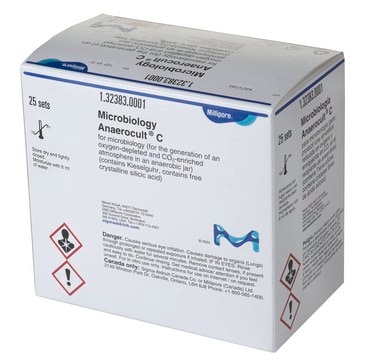28029
Anaerobic jar
suitable for microbiology
Synonym(s):
Anaerobic Chamber, Anaerobic Culture Jar
About This Item
Recommended Products
material
polycarbonate lid
application(s)
microbiology
Application
An easy to operate vacuum relief screw permits the inlet of air to the jar, thus overcoming any difficulty which could be caused by the presence of negative pressure.
The Anaerojar is lightweight and robust with excellent space saving features; there are no external clamps or protruding valves and the carrying handle tucks away into the lid of the jar itself.
Anaerogen is a kit for use with the Anaerojar. It produces an anaerobic atmosphere rapidly without the use of water or catalyst. No hydrogen is produced. The oxygen is absorbed rapidly without build up of pressure. The final atmosphere contains less than 1% oxygen supplemented with carbon dioxide - ideal for optimum growth of anaerobes and increased colony size.
Anaerobe atmosphere generation bags (Cat. No. 68061) are not included.
Suitable cleaning agents:
Virkon:
Is a multi-purpose disinfectant. It contains oxone (potassium peroxymonosulphate), sodium dodecylbenzenesulfonate, sulphamic acid; and inorganic buffers. It is typically used for cleaning up hazardous spills, disinfecting surfaces and soaking equipment. The solution is used in many areas, including hospitals, laboratories, nursing homes, funeral homes, medical, dental and veterinary facilities, and anywhere else where control of pathogens is required.
MicroSol 3+:
Available in concentrate, ready-to-use spray and handy wipes, the MicroSol 3+ decontaminant′s unique blend of twin chain quaternary ammonium compounds (Q.A.C.s) and amphoretic biocides has proven efficacy against bacteria, fungi, viruses, yeasts and D.N.A.
It is proven to be effective against key human pathogenic micro organisms and interacts with DNA and RNA molecules to have a detrimental effect on their secondary structure, deactivating them within blood, plasma or00 other samples.
MicroSol 3+ serves as a suitable decontamination for pipettes and surfaces for use in molecular biology laboratories and when carrying out DNA profiling for forensic applications. However, the laboratory is not the only place MicroSol 3+ can be used; it can also be used in washroom areas, for food preparation surfaces and for surface decontamination of instruments and electrical appliances.
This lab disinfectant is biodegradable, has low toxicity, with a non-corrosive formula making it user and environmentally friendly. Plus, it leaves no surface residues, doesn′t stain and produces no unpleasant odours to provide the ideal solution for your cleaning or decontamination needs.
Ethanol (70%)
We do recommend washing with hot soapy water. It′s amazing what this can do to clean the jars!
Choose from one of the most recent versions:
Certificates of Analysis (COA)
Sorry, we don't have COAs for this product available online at this time.
If you need assistance, please contact Customer Support.
Already Own This Product?
Find documentation for the products that you have recently purchased in the Document Library.
Articles
Clostridia are relatively large, gram-positive, rod-shaped bacteria that can undergo only anaerobic metabolism.
Clostridia are relatively large, gram-positive, rod-shaped bacteria that can undergo only anaerobic metabolism.
Clostridia are relatively large, gram-positive, rod-shaped bacteria that can undergo only anaerobic metabolism.
Clostridia are relatively large, gram-positive, rod-shaped bacteria that can undergo only anaerobic metabolism.
Our team of scientists has experience in all areas of research including Life Science, Material Science, Chemical Synthesis, Chromatography, Analytical and many others.
Contact Technical Service








